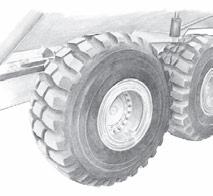
2 minute read
Tyre handling
General
This is a general instruction for the standard tyres in the table under item 7.2. Contact tyre supplier or your local Moxy Dealer for exactspecifications. Off-road tyres produce more heat during operation than tyres for ordinary cars. Therefore, the tyres must be used correctly to obtain long lifetime and safe operation. Please note that the following can cause overheating of tyres: • Too low tyre pressure • Overloading • Driving long distances non-stop • Travelling at high speed
CAUTION
Extremely low temperature (below -40°C) requires special operation!
7.1. Difference in tyre diameter
If it is necessary to change a wheel as a result of puncture or in emergencies, Moxy Engineering AS allows up to 5% difference in the tyre diameter on the same side of the tandem. But the most ideal situation in all cases is to have the same tyre diameter on the same side of the tandem. This is strongly recommended.
7.2. Correct tyre pressures
Tyre pressures mainly depend on operation speed and load. Road configuration, flotation/traction requirements, risk of cutting, hacking, shock damage and ambient temperatures, are also factors to consider.
Both too high and too low tyre pressure may result in damage and shortened lifetime of the tyres. Tyre pressure checks and corrections must be carry out on cold tyres. Basic pressure for cold tyres (based on max. load and max. speed):
Type Front Rear
bar (psi) bar (psi) GoodYear RL2+ ** 2.9 (42) 3.6 (52) Michelin XADN 2.9 (42) 3.6 (52) Bridgestone VLT ** 3.35 (48.5) 4.2 (61)
7.3. Specified loading
Do not overload the dump truck. Maintain an even load distribution, avoid unbalanced loads. Protect tyres from falling stones during loading.

7.4. Proper maintenance
Perform tyre inspections according to Maintenance schedule. Also roads and driving paths should be maintenanced to achieve max. tyre serviceability. Damaged, excessively worn or aged tyres should be replaced. Remove foreign objects from the threads, these will sooner or later penetrate into the tyre. Removal or repairing of tyres should be performed by a tyre specialist to avoid unsafe working conditions.
WARNING
Always let the air out of the tyre before removing foreign objects and before demounting or repairing! See also chapter 2, Safety Instructions (High pressure)
7.5. Transit, long distance drive-away on road
This special type of driving requires special operation: • Check and adjust the tyre pressure on cold tyres before starting. Do not reduce pressure during driving. • Drive only without load. • Drive 2 hours and stop for minimum 30 min. Drive another 2 hours and stop for minimum 1 hour. Repeat. • Upper speed limit for this operation: 32 km/h. Must not be exceeded!







